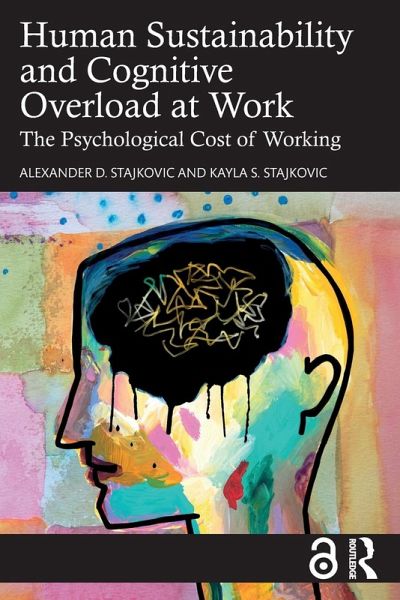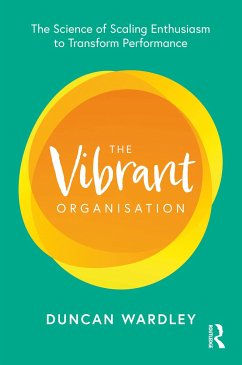
Human Sustainability and Cognitive Overload at Work
The Psychological Cost of Working

PAYBACK Punkte
25 °P sammeln!
This innovative book considers the cost of cognitive overload and psychological distress on human sustainability, and suggests ways to prevent employees from becoming a psychologically depleted workforce.Employee attentional processing capacity is maxed out, and psychological distress is at an all-time high. Alexander D. Stajkovic and Kayla S. Stajkovic explain how human cognitive 'broadband' is at the hunter-gatherer level and changes at an evolutionary snail's pace. Yet the amount of information necessary to make a living now is incomparable to then, and the current relationship between work...
This innovative book considers the cost of cognitive overload and psychological distress on human sustainability, and suggests ways to prevent employees from becoming a psychologically depleted workforce.
Employee attentional processing capacity is maxed out, and psychological distress is at an all-time high. Alexander D. Stajkovic and Kayla S. Stajkovic explain how human cognitive 'broadband' is at the hunter-gatherer level and changes at an evolutionary snail's pace. Yet the amount of information necessary to make a living now is incomparable to then, and the current relationship between workers and organizations is unsustainable. The authors discuss causes, processes, and consequences of human unsustainability at work, as well as suggesting remedies for personal change, leadership practice, and policy development. They frame efforts toward furthering human sustainability as a grand challenge that tackles a chronic problem at a societal level with consequences that have ripple effects into other spheres of life. Drawing from multiple disciplines and data sources, the book offers a theory-driven, evidence-based, and meaningful way to better understanding employee cognitive overload and psychological distress in organizations across the globe, and improve work lives going forward.
Human Sustainability and Cognitive Overload at Work is a useful resource for students and scholars of business, management, leadership, organizational and work psychology, and organizational studies. The practical insights will also help managers, policy makers, policy analysists, consultants, and all those with an interest in the psychological cost of working.
The Open Access version of this book, available at www.taylorfrancis.com, has been made available under a Creative Commons Attribution-Non Commercial-No Derivatives (CC-BY-NC-ND) 4.0 license.
Employee attentional processing capacity is maxed out, and psychological distress is at an all-time high. Alexander D. Stajkovic and Kayla S. Stajkovic explain how human cognitive 'broadband' is at the hunter-gatherer level and changes at an evolutionary snail's pace. Yet the amount of information necessary to make a living now is incomparable to then, and the current relationship between workers and organizations is unsustainable. The authors discuss causes, processes, and consequences of human unsustainability at work, as well as suggesting remedies for personal change, leadership practice, and policy development. They frame efforts toward furthering human sustainability as a grand challenge that tackles a chronic problem at a societal level with consequences that have ripple effects into other spheres of life. Drawing from multiple disciplines and data sources, the book offers a theory-driven, evidence-based, and meaningful way to better understanding employee cognitive overload and psychological distress in organizations across the globe, and improve work lives going forward.
Human Sustainability and Cognitive Overload at Work is a useful resource for students and scholars of business, management, leadership, organizational and work psychology, and organizational studies. The practical insights will also help managers, policy makers, policy analysists, consultants, and all those with an interest in the psychological cost of working.
The Open Access version of this book, available at www.taylorfrancis.com, has been made available under a Creative Commons Attribution-Non Commercial-No Derivatives (CC-BY-NC-ND) 4.0 license.














